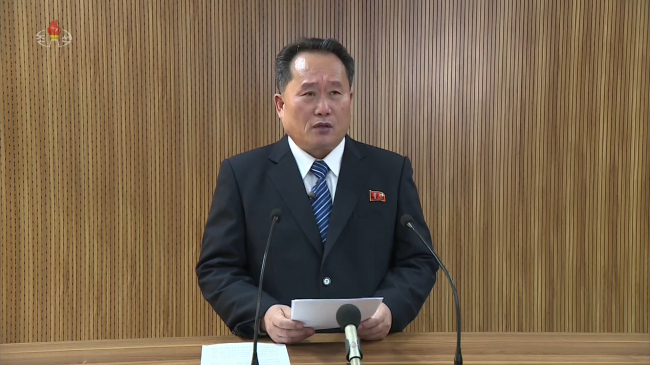North Korea’s announcement of its willingness to revive an inter-Korean hotline was delivered by a man viewed as one of the regime’s key military negotiators.
 |
Ri Son-gwon, chairman of the Committee for the Peaceful Reunification of the Country of the DPRK, reads a statement on North Korea`s state-run broadcaster Korean Central Television on Wednesday. (Yonhap) |
On Wednesday, Ri Son-gwon, chairman of North Korea’s Committee for Peaceful Reunification, spoke on behalf of Kim Jong-un, saying North Korea would reopen its communication channel at the truce village of Panmunjom, in response to Seoul’s proposal for high-level talks. The Committee for Peaceful Reunification is a North Korean organization handling inter-Korean affairs.
“(Kim) gave instructions to open the Panmunjom liaison channel between the North and the South from 3 p.m. (North Korean time) on Jan. 3, so that the issues related to the opening of talks, including the dispatch of the delegation to PyeongChang Olympic Games, would be timely communicated to the South,” Ri said on North Korea’s state-run broadcaster Korean Central Television.
The senior colonel of the North Korean military has often represented his country, having participated in inter-Korean military talks during the liberal Roh Moo-hyun administration and when tensions gradually escalated in the following years. He has been sighted at 27 meetings held between the two Koreas since 2004.
After Kim rose to power in 2011, Ri was appointed director of the policy department of North Korea’s now-defunct National Defense Commission. The NDC was later replaced by the State Affairs Commission, which is chaired by Kim.
Ri is known as the right-hand man of Kim Yong-chul, another top North Korean military official who is allegedly responsible for the sinking of the South Korean naval ship Cheonan in 2010 and the bombing of a South Korean island near a disputed maritime border that followed. Kim, the former director of the North’s Reconnaissance General Bureau, is among those blacklisted by South Korea’s unilateral sanctions against the North.
Media reports in the past have underlined Ri’s fiery temper displayed at inter-Korean meetings. Within the first 10 minutes of a South-North meeting in February 2011, Ri reportedly shouted, “We are completely irrelevant with the Cheonan warship incident,” before bolting out of the meeting room.
In a separate military talk in 2010, Ri also flatly denied North Korea’s involvement in the sinking of the corvette, claiming South Korea’s investigation results were fabricated.
Ri is also a member of the Supreme People’s Assembly Diplomatic Commission, North Korea’s foreign affairs commission that was relaunched after 19 years in April 2017.
Seoul’s Unification Ministry said that if Ri comes as a representative for the expected high-level talks, proposed for Tuesday by Seoul, South Korea’s Unification Minister Cho Myoung-gyon is likely to be his counterpart.
“We have to discuss and cooperate with relevant departments in deciding the representative,” a Unification Ministry official told reporters Thursday, adding that in the current situation, it seems likely that Cho would represent South Korea at the high-level summit.
Analysts here are saying that Kim had considered Ri’s position in the North Korean government before handpicking him to deliver Wednesday’s surprise announcement.
“North Korea doesn’t have a Unification Ministry, but the committee Ri heads could be viewed as the South Korean organization’s counterpart in terms of identity and role,” Koh Yu-hwan, a professor at Dongguk University in Seoul told The Korea Herald. “Which is probably why Kim picked Ri to deliver the message -- in consideration of the Unification Ministry’s identity.” Ri’s televised appearance followed the North Korean leader’s New Year’s Day address in which Kim made a rare overture to South Korea. Kim said both sides “could urgently meet” to discuss relevant matters.
The inter-Korean hotline was restored Wednesday after the North severed all official South-North communication channels following the Seoul’s decision to shutter a joint industrial complex in the border town of Kaesong in 2016.
By Jung Min-kyung (
mkjung@heraldcorp.com)







![[Weekender] Korea's traditional sauce culture gains global recognition](http://res.heraldm.com/phpwas/restmb_idxmake.php?idx=644&simg=/content/image/2024/11/21/20241121050153_0.jpg)
